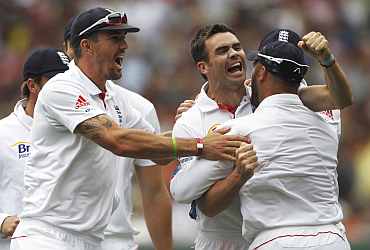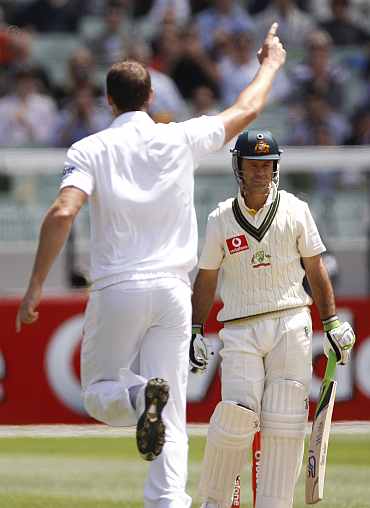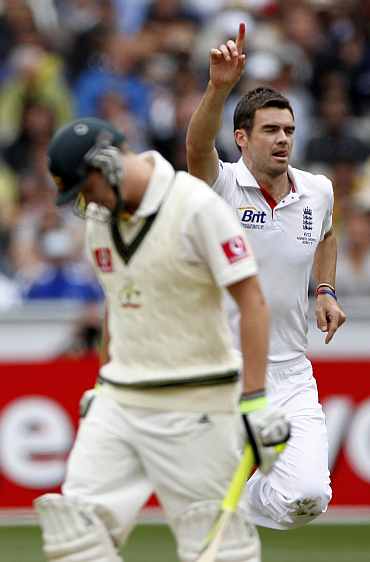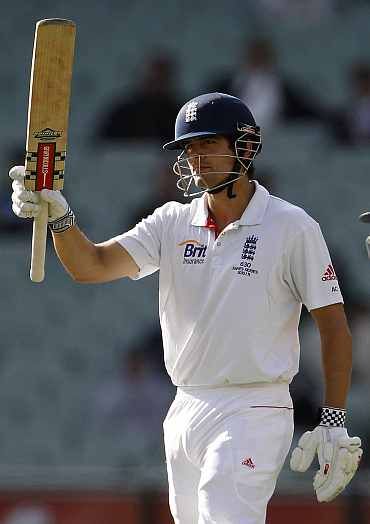 | « Back to article | Print this article |
Pacers put England on top
England took an iron grip on the Ashes by bowling out Australia for a record low score of 98 and then scoring 157 without loss on the opening day of the fourth Test on Sunday.
England can secure a successful Ashes defense by winning this Test at the Melbourne Cricket Ground, and it would take an extraordinary turn of events to prevent the tourists doing that after a dominant first day.
Sent in by England captain Andrew Strauss, Australia was bundled out for its lowest ever score against England at the MCG. All ten wickets fell to catches behind the wicket as the hosts failed to show the disciplined batting required on a seaming pitch.
England's opening pair put on a commanding performance, with Alastair Cook on 80 and Strauss on 64 at stumps.
Australia's score reached all kinds of low
Australia's score reached all kinds of low it's lowest ever against England at the MCG (with the previous worst of 104 dating back to the first ever Test, played in 1877) -- it's lowest ever first innings at the MCG -- the second time Australia had been bowled out for less than 100 in this calendar year it's lowest score on Australian soil since 1984 -- its lowest at the MCG since 1981 -- its lowest against England since 1968 -- and lowest against England in Australia since 1936.
On one of the most disheartening days in Australian cricket history, even the MCG's attempt to break the all-time Test attendance record was not met.
Pre-game predictions of the requisite 91,000 proved overoptimistic with only 84,345 fans taking their post-Christmas hangovers to the ground.
By the end of play it was considerably less, and organisers will be lucky to get half that many for the remaining days of a game already drifting toward a foregone conclusion, hurting Australian cricket's bank balance as much as its on-field fortunes.
Tremlett and Anderson took four-wickets apiece
Strauss had no hesitation in sending Australia in on a grey morning, and with the MCG pitch notoriously difficult to bat upon in the opening session of a Test.
Australia's tentative batting display, the consistently good line and length of the England bowlers, and then the reverse of both in England's innings meant the tourists led on first innings just 72.2 overs into the first day.
It took England less than two rain-shortened sessions to bowl Australia out in 42.5 overs, with six catches taken by wicketkeeper Matt Prior, two in the slips and two at gully, illustrating the ill-discipline of Australia's batsmen, who were constantly tempted to play at balls they should have left alone.
James Anderson and Chris Tremlett ended with four wickets each.
England's performance with the ball was excellent, bowling very few bad deliveries and allowing Strauss to set an attacking field on this helpful surface. Tremlett's height and seam movement were devastating early in the first session.
England openers off to brilliant start
Following the tea break, England strolled to a first innings lead without losing a wicket. It took them only 30.3 overs of their innings to go past Australia. Any thoughts of a miraculous comeback by Australia was put out of their minds by Strauss and Cook's punishing display.
They never looked worried by the bowling as the Australians struggled to get any movement on a drying pitch.
Captain Ricky Ponting, fielding at mid-off to protect his broken left little finger, lost patience with Mitchell Johnson after his first spell of three overs cost 17 runs.
Wicketkeeper Brad Haddin was the most overworked man in the field, constantly diving down the legside to try to save wayward deliveries from all the bowlers.



